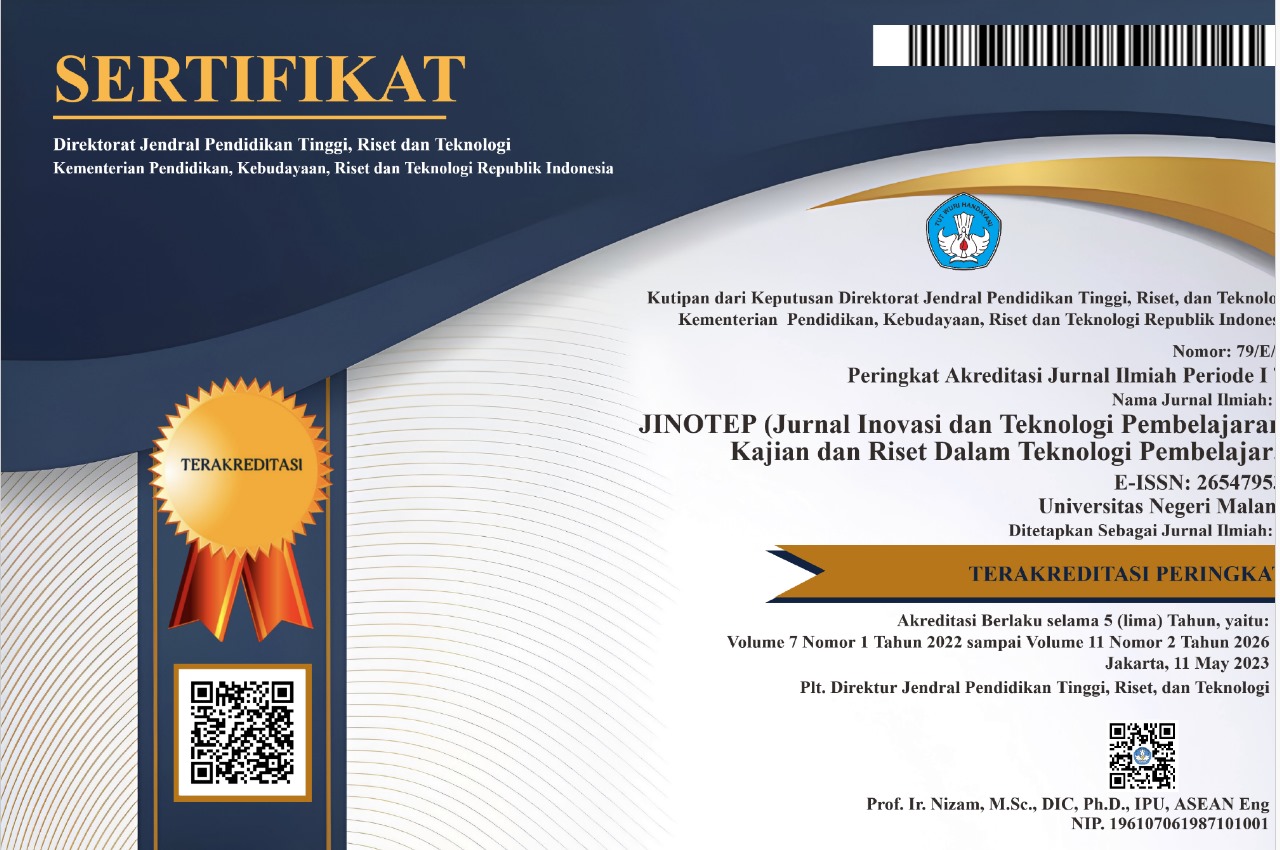An Exploration of Student Satisfaction with Online Learning: A Systematic Review
Abstract
Abstrak: Kepuasan belajar online merupakan konstruk yang dapat digunakan untuk mengevaluasi keefektifan layanan pembelajaran online. Tujuan penelitian ini untuk mengeksplorasi faktor-faktor kepuasan belajar online siswa. Sistematika literature review ini menganalisis 34 jurnal yang dikumpulkan dari dua situs, yaitu Google Scholar dan Semantic Scholar. Pada bagian pertama studi ini didiskusikan isu akademik pembelajaran online, kemudian model kepuasan belajar online yang digunakan para peneliti, dan terakhir menjelaskan prediktor yang dapat mempengaruhi kepuasan belajar online siswa. Hasil analisis menunjukkan bahwa faktor eksternal yang paling signifikan adalah learner content dan interaksi guru dengan siswa. Oleh karena itu, untuk meningkatkan kepuasan belajar siswa, guru diharapkan dapat menyajikan materi digital yang menarik serta meningkatkan kualitas komunikasi yang positif dikelas virtual.
Abstract: Online learning satisfaction can be used to assess how well online learning programs work. This research can help education professionals in their efforts to develop adaptive online learning in dealing with future educational disruptions and challenges through the analysis of various literatures. This systematic literature review explored 34 journals from two sites: Google Scholar and Semantic Scholar. The first part of this study discusses the academic issue of online learning, the second section describes the online learning satisfaction model used by the researchers, and the last part describes the predictors that can affect students' online learning satisfaction. Learner content interaction and teacher-student interactions are the most primary external determinants on online learning satisfaction, according to the analysis' findings. Therefore, teachers are expected to be able to deliver engaging digital contents and enhance positive communication in online setting to increase students’ learning satisfaction.
Keywords
Full Text:
PDFReferences
Ahn, B. B. (2012)General satisfaction of students in 100% online courses in the Department of Learning Technologies at the University of North Texas. Ph.D. thesis, University of North Texas. https://www.learntechlib.org/p/119016/
Azwar S. (2021) Penyusunan skala psikologi. Edisi III.Yogyakarta. Pustaka Belajar
Al-sheeb, B., Hamouda, A. M., & Abdella, G. M. (2018). Investigating determinants of student satisfaction in the first year of college in a public university in the state of qatar. Hindawi Education Research International. https://doi.org/10.1155/2018/7194106
Ali, A., & Ahmad, I. (2011). Key factors for determining student satisfaction in distance learning courses: A study of Allama Iqbal Open University (AIOU) Islamabad, Pakistan. Turkish Online Journal of Distance Education, 12(2), 114–127. https://doi.org/10.17718/tojde.10766
Andersen, Jeffery C. (2013)."Learner satisfaction in online learning: An analysis of the perceived impact of learner-social media and learner-instructor interaction".Electronic Theses and Dissertations. Paper 1115. https://dc.etsu.edu/etd/1115
Barbera, E., E., Clarà, M., & Linder-Vanberschot, J. A. (2013). Factors influencing student satisfaction and perceived learning in online courses. E-Learning and Digital Media, 10(3), 226–235. https://doi.org/-10.2304/elea.2013.10.3.226
Barbour, M. K. (2019). The landscape of K-12 online learning: Examining the state of the field. 4th Edition. New York. Routledge. https://doi.org/10.4324/9781315296135
Basith, A., Rosmaiyadi, R., Triani, S. N., & Fitri, F. (2020). Investigation of online learning satisfaction during COVID 19: in relation to academic achievement. Journal of Educational Science and Technology (EST), 6(3), 265–275. https://doi.org/10.26858/est.v1i1.14803
Bayrak F., Tibi Moanes, Altun Arif. (2020). Development of online course satisfaction scale. Turkish Online Journal of Distance Education, 21(4), 110-123. https://10.17718/TOJDE.803378
Bishwas, P. C. (2020). Online Class and Its Psychological Impact on Satisfaction of University Students COVID-19 PANDEMIC. December. https://doi.org/10.5281/zenodo.4399326
Bolliger, D. U., & Erichsen, E. A. (2012). Student satisfaction with blended and online courses based on personality type / Niveau de satisfaction des étudiants dans les cours hybrides et en ligne basé sur le type de personnalité. Canadian Journal of Learning and Technology / La Revue Canadienne de l’apprentissage et de La Technologie, 39(1). https://doi.org/10.21432/t2b88w
Bishwas, P. C. (2020). Online class and its psychological impact on satisfaction of university students COVID-19pandemic. International Multidisciplinary Research Journal. https://doi.org/10.5281/zenodo.-4399326
Buzzetto. M (2016). Advanced principles of effective e-learning. California. Informing Science Press
Cole, A. W. (2016). Testing the impact of student preference for face-to-face communication on online course satisfaction. Western Journal of Communication, 80(5), 619–637. https://doi.org/10.1080/-10570314.2016.1186824
Dhawan, S. (2020). Online learning: A panacea in the time of Covid- 19 crisis. Journal of Educational Technology Systems, 49(1), 5–22. https://doi.org/10.1177%2F0047239520934018
Dziuban, , C., Moskal, P., Thompson, J., Kramer, L., DeCantis, G., & Hermsdorfer, A. (2015). Student satisfaction with online learning: Is it a psychological contract? Journal of Asynchronous Learning Network, 19(2). https://doi.org/10.24059/olj.v19i2.496
Elfaki, N. K., Abdulraheem, I., & Abdulrahim, R. (2019). Impact of e-learning vs traditional learning on student’s performance and attitude. International Journal of Medical Research and Health Sciences, 8, 76-82.
Elkins, (2015). "Student satisfaction in hybrid courses". Electronic Theses and Dissertations. Paper 2519. https://dc.etsu.edu/ etd/2519
Faize, F. A., ., & Nawaz, M. (2020). Evaluation and improvement of students’ satisfaction in online learning during COVID-19. Open Praxis, 12(4), 495. https://doi.org/10.5944/openpraxis.12.4.1153
Ghaderizefreh, S., S., & Hoover, M. L. (2018). Student satisfaction with online learning in a blended course. International Journal for Digital Society, 9(3), 1393–1398. https://doi.org/10.20533/ijds.2040.2570.-2018.0172
Gray, J. A., & DiLoreto, M. . (2016). The effects of student engagement, student satisfaction, and perceived learning in online learning environments. International Journal of Educational Leadership Preparation, 11, 98-119.
Hakim, M., & Mulyapradana, A. (2020). Pengaruh penggunaan media daring dan motivasi belajar terhadap kepuasan mahasiswa pada saat pandemik Covid-19. Widya Cipta: Jurnal Sekretari Dan Manajemen, 4(2), 154–160. https://doi.org/10.31294/widyacipta.v4i2.8853
Harsasi, M., & Sutawijaya, A. (2018). Determinants of student satisfaction in online tutorial: a study of a distance education institution. Turkish Online Journal of Distance Education-TOJDE. https://doi.org/-10.17718/tojde.382732
Hart, C.G. (2012). Factors sssociated with student persistence in an online program of study: A review of the literature. Journal of Interactive Online Learning, 11, 19-42.
Hawkins, A., Graham, C. R., Sudweeks, R. R., & Barbour, M. K. (2013). Academic performance , course completion rates , and student perception of the quality and frequency of interaction in a virtual high school. Distance Education.37–41. https://doi.org/10.1080/01587919.2013.770430
Hettiarachchi, S., Damayanthi, B. W. R., Heenkenda, S., Dissanayake, D. M. S. L. B., Ranagalage, M., & Ananda, L. (2021). Student satisfaction with online learning during the COVID-19 pandemic: A study at state universities in Sri Lanka. Sustainability (Switzerland), 13(21). https://doi.org/10.3390/su132111749
Joksimović, S., Kovanović, V., Skrypnyk, O., Gašević, D., Dawson, S., & Siemens, G. (2015). The history and state of online learning. Thomson River University.
Khalid, N. M. ((2014). Factors affecting course satisfaction of online Malaysian university students. Doctoral dissertation, Colorado State University.
Kucuk, S., & Richardson, J. C. (2019). A structural equation model of predictors of online learners’ engagement and satisfaction. Online Learning Journal, 23(2), 196–216. https://doi.org/10.24059/-olj.v23i2.1455
Kumalasari, D., & Zakiah, A. (2020). Resiliensi akademik dan kepuasan belajar daring di masa pandemi COVID-19: peran mediasi kesiapan belajar daring. Persona: Jurnal Psikologi Indonesia, 9(2), 353–368. https://doi.org/10.30996/persona.v9i2.4139
Kuo, Y., Walker, A. E., Belland, B. & Schroder, K. (2013). A predictive study of student satisfaction in online education programs. International Review of Research in Open and Distributed Learning, 14 (1), 16–39. https://doi.org/10.19173/irrodl.v14i1.1338
Lee, S. J., Srinivasan, S., T., Lewis, D., & Lopez, S. (2011). Examining the relationship among student perception of support, course satisfaction, and learning outcomes in online learning. Internet and Higher Education, 14(3), 158–163. https://doi.org/10.1016/j.iheduc.2011.04.001
Markova, T., Glazkova, I., & Zaborova, E. (2017). Quality issues ofonline distance learning. Procedia-Social and Behavioral. Sciences., 237,685–691. https://doi.org/10.1016/j.sbspro.2017.02.043
Metz, Kimberly Faith (2011) "Predictors of secondary students' schievement and satisfaction in online Courses". Doctoral Dissertations and Projects. 452. https://digitalcommons.liberty.edu/doctoral/452
Moore, M. G., & Kearsley, G. G. (1996). Distance education: A system view. Wadsworth.
Müller, C., & Mildenberger, T. (2021). Facilitating flexible learning by replacing classroom time with an online learning environment: A systematic review of blended learning in higher education. Educational Research Review, 34, 100394. https://doi.org/10.1016/J.EDUREV.2021.100394
Mustakim. (2020). Efektivitas pembelajaran daring menggunakan media online selama pandemi covid-19 pada mata pelajaran matematika. Al asma: Journal of Islamic Education, 2(1), 1-12. https://doi.org/-10.24252/asma.v2i1.13646
Nguyen, V. A. 2016). Examining students’ satisfaction with online learning activities in blended learning course: a case study. ICERI2016 Proceedings, 1,3155–3164. https://doi.org/10.21125/iceri.2016.-1716
Page, M. J., McKenzie, J. E., Bossuyt, P. M., Boutron, I., Hoffmann, T., Mulrow, C. D., Shamseer, L., & Moher, D. (2020). Mapping of reporting guidance for systematic reviews and meta-analyses generated a comprehensive item bank for future reporting guidelines. Journal of clinical epidemiology, 118, 60-68. https://doi.org/10.1016/j.jclinepi.2019.11.010
Pollock, A., & Berge, E (2018), 'How to do a systematic review'.International Journal of Stroke, vol. 13, no. 2, pp. 138-156. https://doi.org/10.1177/1747493017743796.
Pramono, W. H., Sugiyanto, E., & Prasetyo, C. (2020). The overview of satisfaction level of online learning system student during Covid 19 pandemic. Proceedings of the International Conference on Nursing and Health Sciences, 1(1), 107-112. Retrieved from http://jurnal.globalhealthsciencegroup.com/-index.php/PICNHS/article/view/300
Ranadewa, D. U. N., Gregory, T. Y., Boralugoda, D. N., Silva, J. A. H. T., & Jayasuriya, N. A. (2021). Learners’ satisfaction and commitment towards online learning during COVID-19: a concept paper. Vision, 09722629211056705. https://10.1177/09722629211056705
Rothman, T., Romeo, L., Brennan, M., & Mitchell, D. (2011). Criteria for assessing student satisfaction with online courses. International Journal for e-Learning Security, 1(1/2), 27-32. https://doi.org/10.1.1.-453.65
Rubin, B., Fernandes, R., & Avgerinou, M. D. (2013). The effects of technology on the Community of Inquiry and satisfaction with online courses. The Internet and Higher Education, 17, 48-57. https://doi.org/-10.1016/j.iheduc.-2012.09.006.
Sterling, K. W. S. (2015). Student satisfaction with online learning. Doctoral dissertation.University of California, Santa Barbara, 13(3), 1576–1580.
Strachota, E. M. (2003). Student satisfaction in online courses: An analysis of the impact of learner-content, learner-instructor, learner-learner and learner-technology interaction. The University of Wisconsin-Milwaukee.
Strong, R. Wynn, J. T., Student, D., Mcclure, M. M., & Student, D. (2012). Investigating Students' Satisfaction with eLearning Courses: The Effect of Learning Environment and Social Presence. Journal of Agricultural Education, 53(3), 98–110. https://doi.org/10.5032/jae.2012.03098
Surahman, E., & Sulthoni. (2020). Student satisfaction toward quality of online learning in indonesian higher education during the Covid-19 Pandemic. Proceedings - 2020 6th International Conference on Education and Technology, ICET 2020, 120–125. https://doi.org/10.1109/ICET51153.2020.9276630
Suryani, N. K., Ayu, I., & Widani, P. (2021). Student e-Learning satisfaction during the Covid-19 pandemic in Bali , Indonesia. Jurnal Economia, 17(1), 141–151. https://doi.org/10.21831/economia.v17i1.33196
Susanti, Izzanil Hidayati, Nila Anggreiny, and Yantri Maputra, (2020). School from Home during COVID-19 Pandemic, a Descriptive Study: Effectivity of Learning towards High School Students in West Sumatra. KnE Social Sciences, 430-445. https://10.18502/kss.-v4i15.8231
Wu, J. H., Tennyson, R. D., & Hsia, T. L. (2010). A study of student satisfaction in a blended e-learning system environment. Computers and Education, 55(1), 155–164. https://doi.org/10.1016/j.compedu.2009.-12.012
Zahro, I. F., & Amalia, R. (2021). Deskripsi kemandirian belajar siswa dalam pembelajaran daring pada masa pandemi Covid-19. Attanwir Jurnal Kesilaman Dan Pendidikan, 12(1). http://e-jurnal.staiattanwir.-ac.id/index.php/attanwir/index
Zamakhsari, Z., & Ridzuan, A. (2016). An investigation on students participation and satisfaction towards online learning. IEEE Conference on E-Learning, e-Management and e-Services, IC3e 2015, 143–147. https://doi.org/10.1109/IC3e.2015.7403502
Zeng, X., & Wang, T. (2021). College student satisfaction with online learning during COVID-19: A review and implications . International Journal of Multidisciplinary Perspectives in Higher Education, 6(1), 182–195. https://doi.org/10.32674/jimphe.v6i1.3502
Zhu, C. (2017). University student satisfaction and perceived effectiveness of a blended learning course. International Journal of Learning Technology, 12(1), 66-83. https://doi.org/10.1504/IJLT.-2017.083996
DOI: http://dx.doi.org/10.17977/um031v9i32022p280
Refbacks
- There are currently no refbacks.
Copyright (c) 2022 Maulana Arif Muhibbin, Primatia Yogi Wulandari, Fitri Andriani, Afa Fauzul Adzim

This work is licensed under a Creative Commons Attribution-ShareAlike 4.0 International License.
======================================================================
Jurnal Inovasi dan Teknologi Pembelajaran published by Universitas Negeri Malang in collaboration with the Asosiasi Program Studi Teknologi Pendidikan Indonesia (APS TPI) and Ikatan Profesi Teknologi Pendidikan Indonesia (IPTPI) with a MoU.
Publisher Address:
Educational Technology Laboratorium, Building D5, 1st Floor
Faculty of Education, Universitas Negeri Malang
Semarang St. No. 5, Malang City, East Java Province, Postal Code 65145
Email: jinotep.fip@um.ac.id
======================================================================

JINOTEP is licensed under a Creative Commons Attribution-ShareAlike 4.0 International License.
JINOTEP Statistics (Since July 13th, 2020)



.png)




.png)
1.png)
1.png)
4.png)
2.png)
1.png)
1.png)
.png)


_3.png)





1.png)
.png)